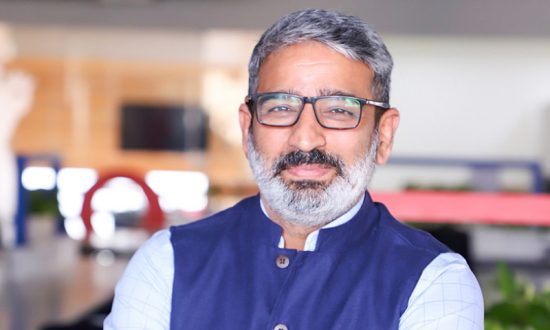Lalit Mehta, the Co-founder & CEO at Decimal Technologies is the driving force behind the company that has pioneered digital banking over the last decade. Lalit founded Decimal Technologies in 2009, when the concept of digital transformation in the BFSI sector was in its infancy. Under his leadership, the company enabled early adopters in Indian banking ecosystem to implement digital technologies and thereby helping them to become leaders in new-age banking today.
The digital transformation of the financial sector has been underway for several years globally. The pandemic created more opportunities to innovate new digital financial services in a socially distanced world, while also uncovering the gaps in the Indian financial system, such as the inaccessibility of credit to Micro, Small and Medium Enterprises (MSMEs). MSMEs are growth engines of the Indian economy, contributing to about 30% of the GDP. But the MSME credit gap amounts to around $240 billion due to traditional institutions’ lack of flexibility and their inability to effectively leverage the available user data and viably reach the semi-urban and rural areas. Credit access to MSMEs can support the growth of the Indian economy and bring in financial and social inclusion. Integration of technology into financial services is the answer. It can make financial services faster, more efficient and less costly than traditional financial services, resulting in increased access to digital financial services for the MSMEs.
Open banking is one such solution that is emerging as a way to revolutionise the way credit is disbursed, making it more suited to the financial situations of MSMEs. Open banking refers to a system where banks and other financial institutions allow third parties, such as fintech companies, to access users’ financial data via secure Application Program Interfaces (APIs). APIs can enable fintechs to build new services that are more efficient and accessible and allow traditional financial institutions to offer digital-first experiences.
Promoting inclusivity
The pandemic highlighted the inaccessibility of loans to MSMEs who were unable to get credit to keep themselves afloat. Open APIs can help financial institutions digitise lending and address the growing credit demand with the advantage of being customisable to the specific needs that might not all be addressed by a single legacy product. These solutions offer flexibility that suit the borrowers’ needs that might not always be feasible for traditional institutions to address.
Open API marketplaces can directly connect the lenders and borrowers to enable lending via digital platforms. Open APIs provide fintechs access to the large amount of data traditional financial institutions have and enable them to sort it into actionable insights. This means allowing alternative data to determine the creditworthiness of an MSME rather than just the business’ financial statements or collaterals, opening up credit access to them.
The alternative data is also helping financial institutions better target their users with financial products that suit them the most at the exact moment of need, resulting in the specific needs of MSMEs being addressed. Traditional banks with their isolated data cannot get as good an insight into their customers and will lag behind.
Expanding the reach of credit to MSMEs that largely operate out of rural and semi-urban areas can be costly for traditional financial institutions, especially as many still require in-person communication, hindering the growth of inclusion. Here, open API development by fintechs can prove to be the solution as the user information can be shared with third-party digital lending applications that complete the whole lending process on one platform virtually.
Enabling last-mile connectivity
In the current Indian credit access scenario, fintechs and traditional financial institutions need to partner and collaborate to adopt APIs for inclusive and omni-channel lending solutions. Fintechs can enable last-mile connectivity by offering financial institutions support to scale to a more diverse user-base without incurring heavy expenditure.
As the industry moves towards becoming more customer-centric, fintech partnerships and open APIs are gaining importance due to their ability to deliver customised efficient products. In order for the legacy institutions to stay ahead of the cut-throat competition, they will need to innovate to provide more inclusive products that will extend credit needed to help the Indian MSMEs grow and scale post-pandemic.


